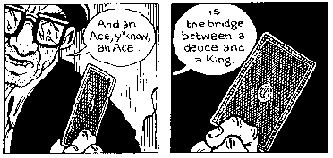

[ Metro | Metroactive Central | Archives ]
Fools of Wisdom
Jason Lutes tells his stories between the panels in a brilliant new comic book
By Richard von Busack
SO MANY CARTOONISTS, so few with the ability to make a picture worth a thousand words. Jason Lutes' at once sentimental and acerbic two-part Jar of Fools (Black Eye; $9.95 each) marks him as one of the best cartoonists working today.
The story is full of such potentially Damon Runyonoid mawkish themes as heartbreak, the homeless and magicians on the skids in a beat, rained-on modern city. And yet the writing and art dazzle with rare beauty and emotional impact.
Jar of Fools started as a weekly comic strip. I can't imagine how it went over in serialized form. It must have been confusing as hell, because Lutes constructs his story through inference, not through a strong narrative.
Also, like the best sentimental filmmakers, he gives the observer room to imagine the details of what we're seeing. Such tales of heartbreak are best when the details are kept vague; thus, a specific story of lost romance becomes particular and personal.
The haunted alcoholic magician Ernie Weiss (Ehrich Weiss, incidentally, was Houdini's real name) and his ex-girlfriend Esther O'Dea may have been together for eight months or eight years. What separated them was a passion Esther had for Ernie's brother, Howard. Ernie has been lost ever since he discovered the attraction, which was followed shortly by Howard's death.
Drunk, jobless and near eviction, Ernie is rescued by the reappearance of his mentor and surrogate father, Al "The Great" Flosso. A former society magician, Flosso is now a grouchy old man with thick glasses (from cataract surgery), shrunken to the point where his top hat is a third of his height.
Faced by Ernie's obsession with his dead brother, Flosso makes the gruff assertion: "I'm telling ya, the dead don't come back. I got enough dead friends to know. If the dead could communicate, believe me, I'd know it."
He's not telling the full truth, because the dead are coming back to him. Through senile reveries--he's losing ground rapidly--Flosso mistakes the living characters for his dead peers on the vaudeville circuit.
The back story is revealed through dreams and the parallel life of Esther, who is working a job she hates at a cafe (Lutes shows this hatred quickly and deftly, and doesn't get the narrative stuck in it) and passing on her misery and fury to a new boyfriend.
Her path back to Ernie is led by Nathan Lender, a seedy confidence man who hustles her at the cash register. Nathan wants Ernie to teach Lender's young daughter, Claire, how to become a magician, figuring that she'll need a job skill. The quartet (not counting Esther), ends up camped out under a highway bridge, living around a lean-to made out of a raised car trunk and a tarp.
LUTES' COMIC BOOK is dedicated, among others, to Scott McCloud, whose seminal work, Understanding Comics, is to this maligned and ailing art form what André Bazin's What Is Cinema? is to the movies.
McCloud, like Will Eisner before him, is intrigued by what happens between the panels, theorizing that this is where the heart of comics lies. The abstraction of Jar of Fools--it's a story more suggested than told--is not just as candy for the eye, like most comics, but stimulation for the brain: a puzzle, a mystery.
Lutes' masterful control of the essence of comics continues in his facility with mute images, poetic dialogue and characterization. I'm especially taken by how Lutes shows Esther's toughness and numbness by having her examine herself in the mirror while talking on the phone to a man she's been sleeping with but doesn't care much about.
Lutes is also quite poignant in his scripting for the touchingly conceived, appealing Claire. In the camp under the freeway, the concrete pilings tower up like redwoods. Says Claire: "This is my favorite place to live. It reminds me of the forest where mom and dad used to take me."
As in the very best that's been achieved in realistic comics, Lutes' creations are less like images and more like actors. Lutes doesn't have much company in current comic art, where the real rewards are to be found in making anatomy realistic while neglecting the writing that makes a story live. It's a lost art. As Flosso says, "You and I know it ain't a magician's world anymore."
[ Metro | Metroactive Central | Archives ] This page was designed and created by the Boulevards team.

Tricks of the Trade: Flosso the Magician offers some wisdom on the shuffle of destiny's deck in "Jar of Fools."
From the May 9-15, 1996 issue of Metro
Copyright © 1996 Metro Publishing and Virtual Valley, Inc.